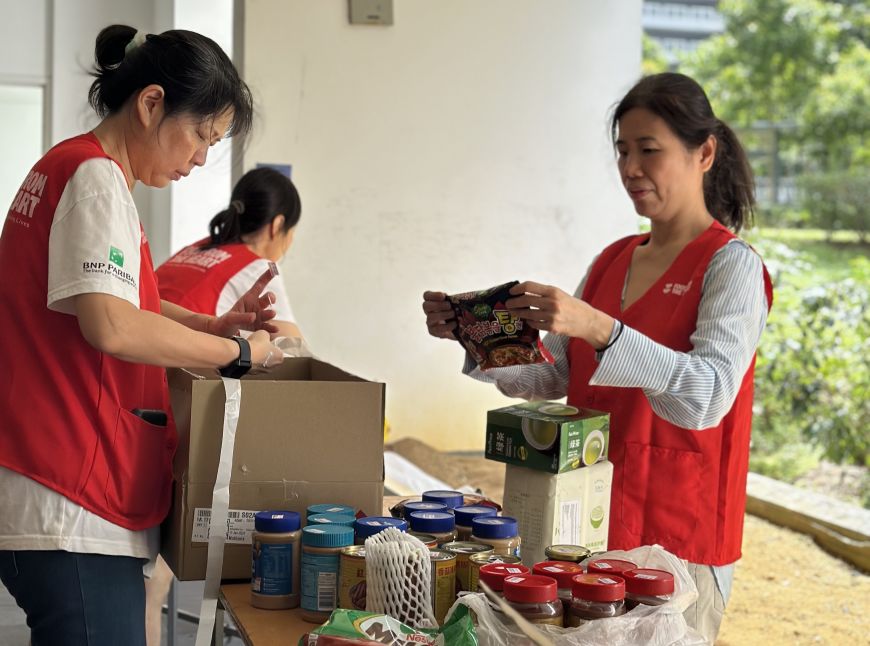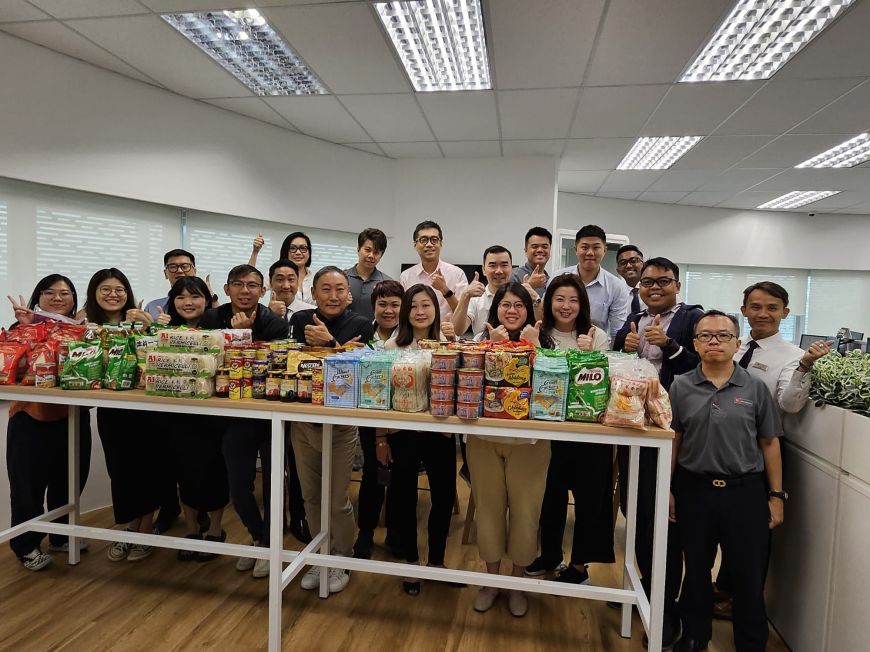Receive updates about our volunteering opportunities and latest happenings.
Published: 15 January 2024, Monday

Corporate giving and philanthropy are essential practices that extend beyond mere traditional charity, weaving into the very fabric of corporate identities to actively shape a society where no individual is left behind due to socio-economic disparities. These activities represent a commitment to fostering societal progress and serve as a vital pillar in supporting the bridge between economic prosperity and community welfare.
In the context of Singapore, corporate philanthropy is seen not only as a duty but as a core aspect of a company's identity and operations. It encompasses everything from direct financial support to various charities to initiating projects that involve employees in hands-on community service. This approach to philanthropy is supported by a regulatory environment that encourages companies to contribute to social welfare actively.
By actively participating in these initiatives, companies not only enhance their societal impact but also enrich the lives of their employees, fostering a workplace environment that prides itself on empathy and ethical responsibility.
Imagine a Singapore where every business becomes a beacon of hope. At Food from the Heart, we have seen this vision come to life as companies embrace corporate charity, not just as an act of goodwill but as a core part of their identity.
By stepping up as a company to support meaningful social causes, business organisations are doing more than just helping those in need. In "Building a better tomorrow for all, together" an article published in The Business Times, Mr Patrick Lee, CEO of Standard Chartered Bank, detailed the advantages of its corporate giving.

Corporate volunteers from Standard Chartered Bank at HEART ON WHEELS food donation drive
Beyond making profits, corporations can also make a difference in society. This demonstrates a dedication to making a positive change in society, which in turn, brings multifaceted benefits over time.
Corporate charity is not a new concept, but its significance has soared in recent years. Today's discerning consumers and employees seek more than just quality services or products; they are drawn to businesses that demonstrate genuine social responsibility.
When it comes to enhancing a company's brand reputation, charitable giving is a powerful tool. Take Microsoft, for instance. Its philanthropic division has extended technology grants to numerous non-profit organisations. This commitment has not only empowered these organisations to amplify their impact but has also cemented Microsoft’s image as a frontrunner in corporate social responsibility, showcasing the power of technology for the greater good.
Corporate philanthropy can serve as the lifeblood of local community initiatives, fostering significant social impact. Take for example, the initiatives of FairPrice Group. Through NTUC FairPrice Foundation, their registered charity which was set up with a mission to provide "A Better Life for the Community", they have championed numerous community programmes. Their community involvement goes beyond charitable support; they also encourage employees to volunteer, thus creating a ripple effect of positive change within society.

Resorts World Sentosa's Eat Well @ Community Shop initiative aims to provide lower income families with better access to fresh produce
Studies have shown that organisations with robust corporate charity programmes tend to have lower employee turnover rates. After all, Employees often feel more invested in a company that mirrors their own values and gives back to the community. This alignment can be a critical factor in not only retaining talent but also attracting new employees who prioritise corporate responsibility in their job search. 
Corporate volunteers from BNP Paribas help with food checking and sorting at a recent food donation drive
Furthermore, corporate donations are eligible for a 250% tax deduction in Singapore, a significant incentive for businesses to engage in charitable activities. This deduction applies to cash donations made to approved charities and Institutions of a Public Character (IPCs) and is also available for qualifying expenses incurred when employees volunteer their services to these organisations.
It is important to note that to reap these financial benefits, businesses must ensure that their donations are made to approved charities and IPCs. Note that donations must be made to organisations that are able to issue tax-deductible receipts.
Businesses in Singapore have a multitude of avenues to engage in corporate philanthropy, each offering unique benefits and opportunities to make a substantial impact.
Corporate volunteering programmes provide employees with opportunities to engage directly with community initiatives, offering their time and skills to make a tangible difference. These programmes not only aid those in need but also foster team cohesion and enhance employee satisfaction by aligning corporate actions with personal values.
Your organisation can amplify its impact through strategic sponsorships, such as supporting Food from the Heart’s wide array of initiatives. Whether it's sponsoring specific events, campaigns, or general operational support, corporate sponsorships ensure that vital community programmes continue to thrive. These contributions can be in the form of cash or in-kind donations, each playing a crucial role in sustaining the operations and extending the reach of our charitable efforts.
Making a cash donation is a direct and impactful way to support the essential work of Food from the Heart. Every dollar contributed aids in covering operational costs and purchasing necessary supplies for our beneficiaries. Your financial support enables us to continue vital programmes such as Community Food Pack and School Goodie Bag, among others. These initiatives ensure that the basic needs of Singapore's underprivileged families are met, contributing to a more equitable society.
How has the landscape of corporate philanthropy evolved, and what does the future hold?
In Singapore, corporate giving has seen a dynamic shift. While the number of businesses engaging in philanthropy has increased, there has been a slight decline in the overall value of financial contributions. The COVID-19 pandemic underscored the resilience of businesses, with those remaining robust amplifying their charitable efforts to support community needs.
Looking ahead, corporate giving in Singapore is set to become even more strategic and integral to corporate identities. Companies are set to diversify their philanthropic approaches and embrace monetary donations, in-kind contributions, and volunteerism. This trend reflects a growing understanding that corporate social responsibility is not just an add-on but a core component of business strategy. By aligning corporate giving with business goals, companies can create a more substantial, lasting impact on society. This thoughtful and measured approach to philanthropy signifies a deeper commitment to building a compassionate and resilient community, ensuring that corporate actions resonate beyond the boardroom and into the heart of the community.
Now that we have explored the various benefits of corporate charity, let's redefine the essence of business success. It's time to look beyond the balance sheets and profit margins and measure achievements not just in dollars and cents, but in the smiles we bring to faces and the lives we touch.

Photo from Sime Darby Services' LinkedIn post
At Food from the Heart, we invite you to partner with us on this journey of social transformation. Our programmes and activities, such as Bread Run and School Goodie Bag, provide tangible opportunities to engage in corporate volunteering in Singapore and directly contribute to alleviating hunger. By doing so, you don't just tick a box for corporate social responsibility; you build stronger social connections and create ripples of change that benefit all. Join us on this transformative journey, and be a vital part of nourishing lives and sharing hope in Singapore.
